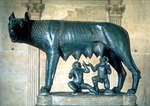
Remus
Remus and his twin brother Romulus were the founders of Rome in Roman mythology. Their mother was Rhea Silvia, daughter of the king of Alba Longa, Numitor, and their father was Mars, the Roman god of war and equivalent of the Greek god Ares. The twin babies were left to die by their uncle in the Tiber river, but they were saved by miracle; they were washed on one of the river banks, where they were found by a she-wolf that provided them with her milk. They were then found by a shepherd and his wife, who raised them to adulthood. Unaware of their royal origins, their innate leadership skills gained them the people's favour. Once they found out who they were, they killed their uncle, and decided to found a new city.
Romulus preferred the Palatine Hill as the site of the new city, while Remus wanted it to be the Aventine Hill. After a quarrel, Remus was killed and Romulus named the new city Rome after himself. He then proceeded to create an army, consisting of regiments of 3000 infantry and 3000 cavalry, called legions. The city of Rome eventually expanded and spread over five of the seven hills of Rome.
See Also: Romulus, Mars
Remus Q&A
Remus Associations
Link/Cite Remus Page
Written by: The Editors of GreekMythology.com. GreekMythology.com editors write, review and revise subject areas in which they have extensive knowledge based on their working experience or advanced studies.
For MLA style citation use: GreekMythology.com, The Editors of Website. "Remus". GreekMythology.com Website, 09 Mar. 2016, https://www.greekmythology.com/Myths/Mortals/Remus/remus.html. Accessed 26 April 2024.

